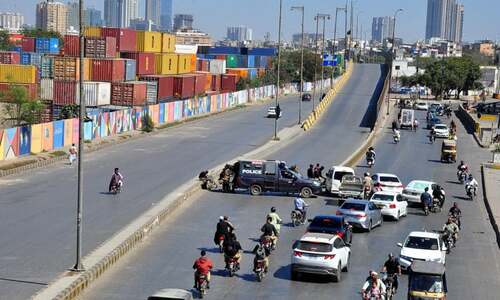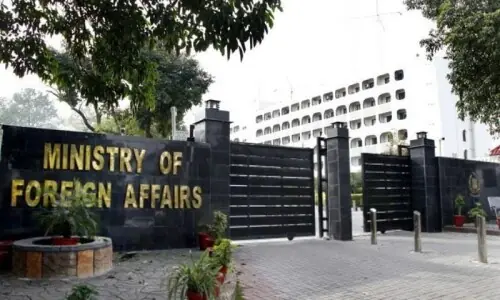“The two most beautiful words in the English language are 'Check enclosed',” wrote Dorothy Parker. But I do not agree with her. To a 'desi' like me, the most beautiful words in the English language are the ones that have the fragrance of one of the languages I love most: Urdu. Yes, English has borrowed words from Urdu, too, as it is an insatiable borrower and has borrowed words from as many as 120 languages. This is, perhaps, one of the reasons why English has one of the richest vocabularies among the world languages. At the end of the 15th century, the Portuguese landed at Indian coasts and soon the Dutch, the French and the British followed suit. But in the end it was the British that emerged victorious and with their political clout rising in the subcontinent, the assimilation of English words into Urdu began; a natural phenomenon as the language and the culture of the conquerors inevitably influence those of the conquered. As languages are somewhat like multilane highways connected with narrow alleys, the interaction between two languages is usually a two-way affair. Certain vernacular vocabulary, therefore, began to find its way into the language of the colonialists and the English language began assimilating words from yet another exotic source.
The study of words of Indian origin borrowed by the English language is very interesting and the dictionaries enlisting such words are witness to the intriguing nature of the study that has hooked many an academic over the last several centuries. 'An Anglo-Indian Dictionary', written by George Clifford Whitworth, was perhaps the earliest of such works. First published in 1842, it was revised in 1885. In 1886, the famous work of Henry Yule and A. C. Burnell 'Hobson Jobson' appeared. In recent times, Ivor Lewis's 'Sahibs, nabobs and boxwallahs' was published by Oxford. Packed with enormous bibliographic details and references, it was a delectable addition to the commendable body of such works. About a decade ago, Dr Abdur Rahman Brahvi's 'Angrezi par Urdu ka asar' was published by the National Language Authority. Though the list does not end here, it is not too long either (and in writing this piece, I have drawn upon all these books in addition to some other).
An interesting aspect of the English words of sub-continental origin is that many of them are the result of misinterpreting the original pronunciation and its inaccurate reproduction in the English orthography. 'Hobson Jobson', for example, writes Ivor Lewis, “is a far cry from its origins in the frenzied and impassioned wailings of 'Ya Hassan! Ya Husain!'. Then he goes on to mention the phrase's further mutations in different languages and says “before its now final Anglo-Indian form it underwent the strangest metamorphoses from Dr Fryer's 'Hossen-Gosseen' and 'Hossy-Gossy' in the seventeenth century, to 'Saucem-Saucem' among the Portuguese in the eighteenth, to 'Jaksom-Baksom' among the Dutch in the same century, coming to rest as a respectable term in the linguistics in the twentieth, meaning the assimilation of a foreign expression to conform to the 'sprachgefuhl' of the recipient language”. 'Sprachgefuhl', by the way, is a German word meaning 'the instinctive feeling for a language, especially sensitiveness to the idiom etc of a foreign language'.
Another interesting example of such assimilation is given by Dr Brahvi in his book. According to him, some English writers have spelt Siraj-ud-Daula's name as Sir Roger Dowler.
Before I enlist the Urdu loanwords in English I must clarify that the list does not include any word that has in turn been borrowed by Urdu from Arabic or Persian. By 'Urdu' here I mean a language that has its roots in the Indo-Pakistan subcontinent and that has a common ancestor (such as Sanskrit or Prakrit) with its sister, Hindi. The list is too long to be given here in full but some of my favourites are:
The word 'bangle' meaning an ornamental band worn on the wrist or arm is derived from 'bangli' or 'bangri', which means a bracelet made of glass.
A colourful cotton fabric with a glazed finish is called 'chintz' in English. Its origin is 'chheent', meaning speckle, blot, spot, as the fabric is a multicoloured printed one.
The Concise Oxford English Dictionary (COED) says 'Blighty' (with a capital B) means: “Britain or England, as used by soldiers serving abroad in the first and second World Wars.” The origin is 'bilayati', a corruption of 'wilayati'. The Arabic word 'wilayat', meaning kingdom or land, is also used with the suffix 'i' in Persian and Urdu and means 'of or concerning foreign land'. It was commonly mispronounced among semi-literate natives of the subcontinent as 'bilayati' and the British took it as Blighty.
A one-storey house is known as bungalow. The origin is 'bangla'. In Urdu 'bangla' originally meant of or relating to Bengal. It was also used for a thatched house in Bengal and afterwards elsewhere in India.
When a dried tobacco leaf is cut and rolled in a particular way, it becomes a cigar with both ends open. In Urdu it is called 'churat' or 'churoot'. Though it is originally a Tamil word, English adopted it as 'cheroot'.
In Britain's informal parlance 'dekko' means a quick glance. It is simply Urdu's 'dekho', meaning 'look!', imperative of infinitive 'dekhna', to look or see. Another word taken almost same as it is used in Urdu is 'loot'. It is used both as noun and verb in English and a derivative is looter. Thugs were organised robbers and killers in India and the British eliminated them in 1830s. The word was absorbed in English as it is and its derivative is thuggery. It is interesting to note that thugs had their own secret lingo, dictionary of which was compiled in Urdu in 1830s and was recently compiled and published in India.
'Cot' means a small bed for a young child. But the origin is Urdu 'khaat' or bedstead, also known as 'charpai'. 'Charpai', literally meaning four legs, also found its way into English and is spelt as 'charpoy', meaning light bedstead. In Urdu 'dangree' or 'dungree' was a kind of coarse cotton. Now in English dungaree or dungarees means trousers held up by straps over the shoulders. 'Degchee' in Urdu means a small, metallic cooking utensil. The English word Dixie (with a capital D) is but a variation of it. Cashmere is a soft wool, originally from Kashmir. Juggernaut, or a great and overwhelming force, is in fact 'Jagan naath'. 'Jagat' means the world and 'naath' means lord or protector. In Hinduism, it is also a title of Krishna.
'Chota' means young, junior or small. It is simply Urdu's 'chhota'.
'Calico' is a kind of white cotton cloth but the origin is the southwestern Indian port Calicut where it originated. 'Chit' means a small piece of paper, a memorandum, a brief official note or a voucher. But it is 'chitthi' or a letter in Urdu. 'Jungle' is forest, same as Urdu's 'jungal'
For want of space I just jot down a few more words and you can find almost all of them in Concise Oxford English Dictionary (11th edition, revised, 2006): copra (khopra) (dried coconut kernels), Raj (raaj) reign, Pundit, Junta, shampoo (champee), dinghy, coolie (qulli), tom-tom, chutney, bhang, ghee, guru, maharaja, mahout (mahavat), samosa, and the list goes on. drraufparekh@yahoo.com
































